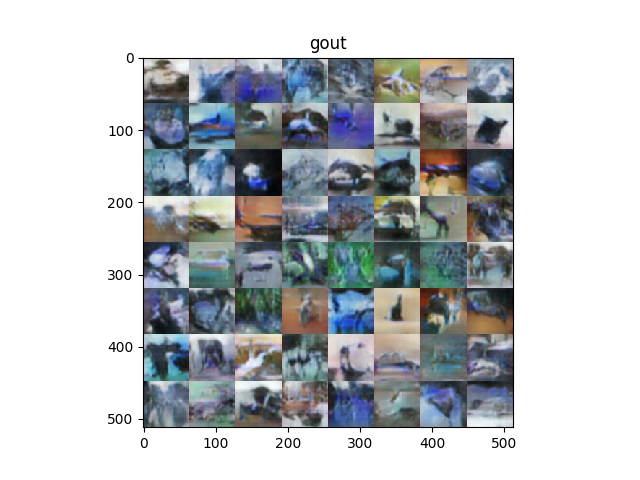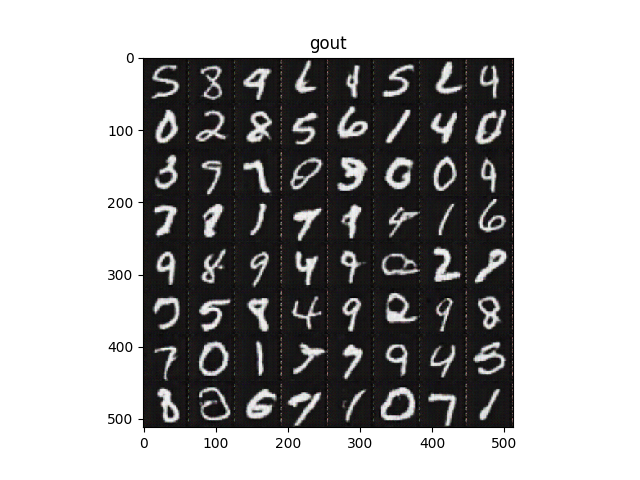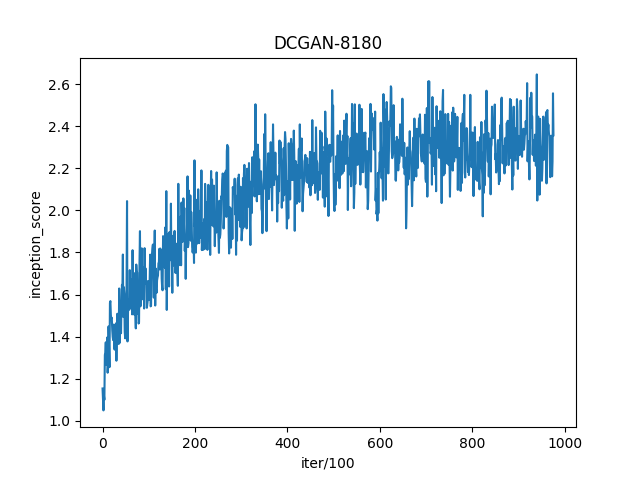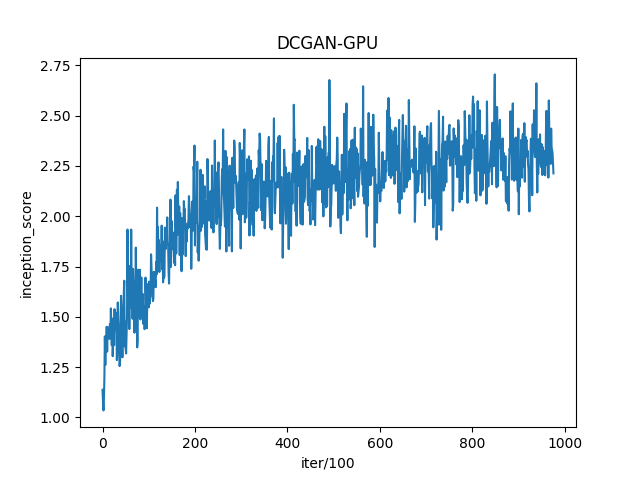You are viewing a plain text version of this content. The canonical link for it is here.
Posted to commits@mxnet.apache.org by sk...@apache.org on 2018/10/21 18:39:32 UTC
[incubator-mxnet] branch master updated: Extending the DCGAN
example implemented by gluon API to provide a more straight-forward
evaluation on the generated image (#12790)
This is an automated email from the ASF dual-hosted git repository.
skm pushed a commit to branch master
in repository https://gitbox.apache.org/repos/asf/incubator-mxnet.git
The following commit(s) were added to refs/heads/master by this push:
new 0137483 Extending the DCGAN example implemented by gluon API to provide a more straight-forward evaluation on the generated image (#12790)
0137483 is described below
commit 013748300a1182f30d80442c7f3b3164b49af25a
Author: pengxin99 <yc...@126.com>
AuthorDate: Mon Oct 22 02:39:18 2018 +0800
Extending the DCGAN example implemented by gluon API to provide a more straight-forward evaluation on the generated image (#12790)
* add inception_score to metric dcgan model
* Update README.md
* add two pic
* updata readme
* updata
* Update README.md
* add license
* refine1
* refine2
* refine3
* fix review comments
* Update README.md
* Update example/gluon/DCGAN/README.md
* Update example/gluon/DCGAN/README.md
* Update example/gluon/DCGAN/README.md
* Update example/gluon/DCGAN/README.md
* Update example/gluon/DCGAN/README.md
* Update example/gluon/DCGAN/README.md
* Update example/gluon/DCGAN/README.md
* Update example/gluon/DCGAN/README.md
* Update example/gluon/DCGAN/README.md
* Update example/gluon/DCGAN/README.md
* Update example/gluon/DCGAN/README.md
* modify sn_gan file links to DCGAN
* update pic links to web-data
* update the pic path of readme.md
* rm folder pic/, and related links update to https://github.com/dmlc/web-data/mxnet/example/gluon/DCGAN/
* Update README.md
---
example/gluon/DCGAN/README.md | 52 +++++
example/gluon/DCGAN/__init__.py | 0
example/gluon/DCGAN/dcgan.py | 340 +++++++++++++++++++++++++++++++++
example/gluon/DCGAN/inception_score.py | 110 +++++++++++
example/gluon/dcgan.py | 236 -----------------------
example/gluon/sn_gan/data.py | 2 +-
example/gluon/sn_gan/model.py | 2 +-
example/gluon/sn_gan/train.py | 2 +-
example/gluon/sn_gan/utils.py | 2 +-
9 files changed, 506 insertions(+), 240 deletions(-)
diff --git a/example/gluon/DCGAN/README.md b/example/gluon/DCGAN/README.md
new file mode 100644
index 0000000..5aacd78
--- /dev/null
+++ b/example/gluon/DCGAN/README.md
@@ -0,0 +1,52 @@
+# DCGAN in MXNet
+
+[Deep Convolutional Generative Adversarial Networks(DCGAN)](https://arxiv.org/abs/1511.06434) implementation with Apache MXNet GLUON.
+This implementation uses [inception_score](https://github.com/openai/improved-gan) to evaluate the model.
+
+You can use this reference implementation on the MNIST and CIFAR-10 datasets.
+
+
+#### Generated image output examples from the CIFAR-10 dataset
+
+
+#### Generated image output examples from the MNIST dataset
+
+
+#### inception_score in cpu and gpu (the real image`s score is around 3.3)
+CPU & GPU
+
+
+
+
+## Quick start
+Use the following code to see the configurations you can set:
+```bash
+python dcgan.py -h
+```
+
+
+ optional arguments:
+ -h, --help show this help message and exit
+ --dataset DATASET dataset to use. options are cifar10 and mnist.
+ --batch-size BATCH_SIZE input batch size, default is 64
+ --nz NZ size of the latent z vector, default is 100
+ --ngf NGF the channel of each generator filter layer, default is 64.
+ --ndf NDF the channel of each descriminator filter layer, default is 64.
+ --nepoch NEPOCH number of epochs to train for, default is 25.
+ --niter NITER save generated images and inception_score per niter iters, default is 100.
+ --lr LR learning rate, default=0.0002
+ --beta1 BETA1 beta1 for adam. default=0.5
+ --cuda enables cuda
+ --netG NETG path to netG (to continue training)
+ --netD NETD path to netD (to continue training)
+ --outf OUTF folder to output images and model checkpoints
+ --check-point CHECK_POINT
+ save results at each epoch or not
+ --inception_score INCEPTION_SCORE
+ To record the inception_score, default is True.
+
+
+Use the following Python script to train a DCGAN model with default configurations using the CIFAR-10 dataset and record metrics with `inception_score`:
+```bash
+python dcgan.py
+```
diff --git a/example/gluon/DCGAN/__init__.py b/example/gluon/DCGAN/__init__.py
new file mode 100644
index 0000000..e69de29
diff --git a/example/gluon/DCGAN/dcgan.py b/example/gluon/DCGAN/dcgan.py
new file mode 100644
index 0000000..970c35d
--- /dev/null
+++ b/example/gluon/DCGAN/dcgan.py
@@ -0,0 +1,340 @@
+# Licensed to the Apache Software Foundation (ASF) under one
+# or more contributor license agreements. See the NOTICE file
+# distributed with this work for additional information
+# regarding copyright ownership. The ASF licenses this file
+# to you under the Apache License, Version 2.0 (the
+# "License"); you may not use this file except in compliance
+# with the License. You may obtain a copy of the License at
+#
+# http://www.apache.org/licenses/LICENSE-2.0
+#
+# Unless required by applicable law or agreed to in writing,
+# software distributed under the License is distributed on an
+# "AS IS" BASIS, WITHOUT WARRANTIES OR CONDITIONS OF ANY
+# KIND, either express or implied. See the License for the
+# specific language governing permissions and limitations
+# under the License.
+
+import matplotlib as mpl
+mpl.use('Agg')
+from matplotlib import pyplot as plt
+
+import argparse
+import mxnet as mx
+from mxnet import gluon
+from mxnet.gluon import nn
+from mxnet import autograd
+import numpy as np
+import logging
+from datetime import datetime
+import os
+import time
+
+from inception_score import get_inception_score
+
+
+def fill_buf(buf, i, img, shape):
+ """
+ Reposition the images generated by the generator so that it can be saved as picture matrix.
+ :param buf: the images metric
+ :param i: index of each image
+ :param img: images generated by generator once
+ :param shape: each image`s shape
+ :return: Adjust images for output
+ """
+ n = buf.shape[0]//shape[1]
+ m = buf.shape[1]//shape[0]
+
+ sx = (i%m)*shape[0]
+ sy = (i//m)*shape[1]
+ buf[sy:sy+shape[1], sx:sx+shape[0], :] = img
+ return None
+
+
+def visual(title, X, name):
+ """
+ Image visualization and preservation
+ :param title: title
+ :param X: images to visualized
+ :param name: saved picture`s name
+ :return:
+ """
+ assert len(X.shape) == 4
+ X = X.transpose((0, 2, 3, 1))
+ X = np.clip((X - np.min(X))*(255.0/(np.max(X) - np.min(X))), 0, 255).astype(np.uint8)
+ n = np.ceil(np.sqrt(X.shape[0]))
+ buff = np.zeros((int(n*X.shape[1]), int(n*X.shape[2]), int(X.shape[3])), dtype=np.uint8)
+ for i, img in enumerate(X):
+ fill_buf(buff, i, img, X.shape[1:3])
+ buff = buff[:, :, ::-1]
+ plt.imshow(buff)
+ plt.title(title)
+ plt.savefig(name)
+
+
+parser = argparse.ArgumentParser()
+parser = argparse.ArgumentParser(description='Train a DCgan model for image generation '
+ 'and then use inception_score to metric the result.')
+parser.add_argument('--dataset', type=str, default='cifar10', help='dataset to use. options are cifar10 and mnist.')
+parser.add_argument('--batch-size', type=int, default=64, help='input batch size, default is 64')
+parser.add_argument('--nz', type=int, default=100, help='size of the latent z vector, default is 100')
+parser.add_argument('--ngf', type=int, default=64, help='the channel of each generator filter layer, default is 64.')
+parser.add_argument('--ndf', type=int, default=64, help='the channel of each descriminator filter layer, default is 64.')
+parser.add_argument('--nepoch', type=int, default=25, help='number of epochs to train for, default is 25.')
+parser.add_argument('--niter', type=int, default=10, help='save generated images and inception_score per niter iters, default is 100.')
+parser.add_argument('--lr', type=float, default=0.0002, help='learning rate, default=0.0002')
+parser.add_argument('--beta1', type=float, default=0.5, help='beta1 for adam. default=0.5')
+parser.add_argument('--cuda', action='store_true', help='enables cuda')
+parser.add_argument('--netG', default='', help="path to netG (to continue training)")
+parser.add_argument('--netD', default='', help="path to netD (to continue training)")
+parser.add_argument('--outf', default='./results', help='folder to output images and model checkpoints')
+parser.add_argument('--check-point', default=True, help="save results at each epoch or not")
+parser.add_argument('--inception_score', type=bool, default=True, help='To record the inception_score, default is True.')
+
+opt = parser.parse_args()
+print(opt)
+
+logging.basicConfig(level=logging.DEBUG)
+
+nz = int(opt.nz)
+ngf = int(opt.ngf)
+ndf = int(opt.ndf)
+niter = opt.niter
+nc = 3
+if opt.cuda:
+ ctx = mx.gpu(0)
+else:
+ ctx = mx.cpu()
+batch_size = opt.batch_size
+check_point = bool(opt.check_point)
+outf = opt.outf
+dataset = opt.dataset
+
+if not os.path.exists(outf):
+ os.makedirs(outf)
+
+
+def transformer(data, label):
+ # resize to 64x64
+ data = mx.image.imresize(data, 64, 64)
+ # transpose from (64, 64, 3) to (3, 64, 64)
+ data = mx.nd.transpose(data, (2, 0, 1))
+ # normalize to [-1, 1]
+ data = data.astype(np.float32)/128 - 1
+ # if image is greyscale, repeat 3 times to get RGB image.
+ if data.shape[0] == 1:
+ data = mx.nd.tile(data, (3, 1, 1))
+ return data, label
+
+
+# get dataset with the batch_size num each time
+def get_dataset(dataset):
+ # mnist
+ if dataset == "mnist":
+ train_data = gluon.data.DataLoader(
+ gluon.data.vision.MNIST('./data', train=True, transform=transformer),
+ batch_size, shuffle=True, last_batch='discard')
+
+ val_data = gluon.data.DataLoader(
+ gluon.data.vision.MNIST('./data', train=False, transform=transformer),
+ batch_size, shuffle=False)
+ # cifar10
+ elif dataset == "cifar10":
+ train_data = gluon.data.DataLoader(
+ gluon.data.vision.CIFAR10('./data', train=True, transform=transformer),
+ batch_size, shuffle=True, last_batch='discard')
+
+ val_data = gluon.data.DataLoader(
+ gluon.data.vision.CIFAR10('./data', train=False, transform=transformer),
+ batch_size, shuffle=False)
+
+ return train_data, val_data
+
+
+def get_netG():
+ # build the generator
+ netG = nn.Sequential()
+ with netG.name_scope():
+ # input is Z, going into a convolution
+ netG.add(nn.Conv2DTranspose(ngf * 8, 4, 1, 0, use_bias=False))
+ netG.add(nn.BatchNorm())
+ netG.add(nn.Activation('relu'))
+ # state size. (ngf*8) x 4 x 4
+ netG.add(nn.Conv2DTranspose(ngf * 4, 4, 2, 1, use_bias=False))
+ netG.add(nn.BatchNorm())
+ netG.add(nn.Activation('relu'))
+ # state size. (ngf*4) x 8 x 8
+ netG.add(nn.Conv2DTranspose(ngf * 2, 4, 2, 1, use_bias=False))
+ netG.add(nn.BatchNorm())
+ netG.add(nn.Activation('relu'))
+ # state size. (ngf*2) x 16 x 16
+ netG.add(nn.Conv2DTranspose(ngf, 4, 2, 1, use_bias=False))
+ netG.add(nn.BatchNorm())
+ netG.add(nn.Activation('relu'))
+ # state size. (ngf) x 32 x 32
+ netG.add(nn.Conv2DTranspose(nc, 4, 2, 1, use_bias=False))
+ netG.add(nn.Activation('tanh'))
+ # state size. (nc) x 64 x 64
+
+ return netG
+
+
+def get_netD():
+ # build the discriminator
+ netD = nn.Sequential()
+ with netD.name_scope():
+ # input is (nc) x 64 x 64
+ netD.add(nn.Conv2D(ndf, 4, 2, 1, use_bias=False))
+ netD.add(nn.LeakyReLU(0.2))
+ # state size. (ndf) x 32 x 32
+ netD.add(nn.Conv2D(ndf * 2, 4, 2, 1, use_bias=False))
+ netD.add(nn.BatchNorm())
+ netD.add(nn.LeakyReLU(0.2))
+ # state size. (ndf*2) x 16 x 16
+ netD.add(nn.Conv2D(ndf * 4, 4, 2, 1, use_bias=False))
+ netD.add(nn.BatchNorm())
+ netD.add(nn.LeakyReLU(0.2))
+ # state size. (ndf*4) x 8 x 8
+ netD.add(nn.Conv2D(ndf * 8, 4, 2, 1, use_bias=False))
+ netD.add(nn.BatchNorm())
+ netD.add(nn.LeakyReLU(0.2))
+ # state size. (ndf*8) x 4 x 4
+ netD.add(nn.Conv2D(2, 4, 1, 0, use_bias=False))
+ # state size. 2 x 1 x 1
+
+ return netD
+
+
+def get_configurations(netG, netD):
+ # loss
+ loss = gluon.loss.SoftmaxCrossEntropyLoss()
+
+ # initialize the generator and the discriminator
+ netG.initialize(mx.init.Normal(0.02), ctx=ctx)
+ netD.initialize(mx.init.Normal(0.02), ctx=ctx)
+
+ # trainer for the generator and the discriminator
+ trainerG = gluon.Trainer(netG.collect_params(), 'adam', {'learning_rate': opt.lr, 'beta1': opt.beta1})
+ trainerD = gluon.Trainer(netD.collect_params(), 'adam', {'learning_rate': opt.lr, 'beta1': opt.beta1})
+
+ return loss, trainerG, trainerD
+
+
+def ins_save(inception_score):
+ # draw the inception_score curve
+ length = len(inception_score)
+ x = np.arange(0, length)
+ plt.figure(figsize=(8.0, 6.0))
+ plt.plot(x, inception_score)
+ plt.xlabel("iter/100")
+ plt.ylabel("inception_score")
+ plt.savefig("inception_score.png")
+
+
+# main function
+def main():
+ print("|------- new changes!!!!!!!!!")
+ # to get the dataset and net configuration
+ train_data, val_data = get_dataset(dataset)
+ netG = get_netG()
+ netD = get_netD()
+ loss, trainerG, trainerD = get_configurations(netG, netD)
+
+ # set labels
+ real_label = mx.nd.ones((opt.batch_size,), ctx=ctx)
+ fake_label = mx.nd.zeros((opt.batch_size,), ctx=ctx)
+
+ metric = mx.metric.Accuracy()
+ print('Training... ')
+ stamp = datetime.now().strftime('%Y_%m_%d-%H_%M')
+
+ iter = 0
+
+ # to metric the network
+ loss_d = []
+ loss_g = []
+ inception_score = []
+
+ for epoch in range(opt.nepoch):
+ tic = time.time()
+ btic = time.time()
+ for data, _ in train_data:
+ ############################
+ # (1) Update D network: maximize log(D(x)) + log(1 - D(G(z)))
+ ###########################
+ # train with real_t
+ data = data.as_in_context(ctx)
+ noise = mx.nd.random.normal(0, 1, shape=(opt.batch_size, nz, 1, 1), ctx=ctx)
+
+ with autograd.record():
+ output = netD(data)
+ # reshape output from (opt.batch_size, 2, 1, 1) to (opt.batch_size, 2)
+ output = output.reshape((opt.batch_size, 2))
+ errD_real = loss(output, real_label)
+
+ metric.update([real_label, ], [output, ])
+
+ with autograd.record():
+ fake = netG(noise)
+ output = netD(fake.detach())
+ output = output.reshape((opt.batch_size, 2))
+ errD_fake = loss(output, fake_label)
+ errD = errD_real + errD_fake
+
+ errD.backward()
+ metric.update([fake_label,], [output,])
+
+ trainerD.step(opt.batch_size)
+
+ ############################
+ # (2) Update G network: maximize log(D(G(z)))
+ ###########################
+ with autograd.record():
+ output = netD(fake)
+ output = output.reshape((-1, 2))
+ errG = loss(output, real_label)
+
+ errG.backward()
+
+ trainerG.step(opt.batch_size)
+
+ name, acc = metric.get()
+ logging.info('discriminator loss = %f, generator loss = %f, binary training acc = %f at iter %d epoch %d'
+ % (mx.nd.mean(errD).asscalar(), mx.nd.mean(errG).asscalar(), acc, iter, epoch))
+ if iter % niter == 0:
+ visual('gout', fake.asnumpy(), name=os.path.join(outf, 'fake_img_iter_%d.png' % iter))
+ visual('data', data.asnumpy(), name=os.path.join(outf, 'real_img_iter_%d.png' % iter))
+ # record the metric data
+ loss_d.append(errD)
+ loss_g.append(errG)
+ if opt.inception_score:
+ score, _ = get_inception_score(fake)
+ inception_score.append(score)
+
+ iter = iter + 1
+ btic = time.time()
+
+ name, acc = metric.get()
+ metric.reset()
+ logging.info('\nbinary training acc at epoch %d: %s=%f' % (epoch, name, acc))
+ logging.info('time: %f' % (time.time() - tic))
+
+ # save check_point
+ if check_point:
+ netG.save_parameters(os.path.join(outf,'generator_epoch_%d.params' %epoch))
+ netD.save_parameters(os.path.join(outf,'discriminator_epoch_%d.params' % epoch))
+
+ # save parameter
+ netG.save_parameters(os.path.join(outf, 'generator.params'))
+ netD.save_parameters(os.path.join(outf, 'discriminator.params'))
+
+ # visualization the inception_score as a picture
+ if opt.inception_score:
+ ins_save(inception_score)
+
+
+if __name__ == '__main__':
+ if opt.inception_score:
+ print("Use inception_score to metric this DCgan model, the reusult is save as a picture named \"inception_score.png\"!")
+ main()
+
diff --git a/example/gluon/DCGAN/inception_score.py b/example/gluon/DCGAN/inception_score.py
new file mode 100644
index 0000000..e23513f
--- /dev/null
+++ b/example/gluon/DCGAN/inception_score.py
@@ -0,0 +1,110 @@
+# Licensed to the Apache Software Foundation (ASF) under one
+# or more contributor license agreements. See the NOTICE file
+# distributed with this work for additional information
+# regarding copyright ownership. The ASF licenses this file
+# to you under the Apache License, Version 2.0 (the
+# "License"); you may not use this file except in compliance
+# with the License. You may obtain a copy of the License at
+#
+# http://www.apache.org/licenses/LICENSE-2.0
+#
+# Unless required by applicable law or agreed to in writing,
+# software distributed under the License is distributed on an
+# "AS IS" BASIS, WITHOUT WARRANTIES OR CONDITIONS OF ANY
+# KIND, either express or implied. See the License for the
+# specific language governing permissions and limitations
+# under the License.
+
+from mxnet.gluon.model_zoo import vision as models
+import mxnet as mx
+from mxnet import nd
+import numpy as np
+import math
+import sys
+
+import cv2
+
+
+inception_model = None
+
+
+def get_inception_score(images, splits=10):
+ """
+ Inception_score function.
+ The images will be divided into 'splits' parts, and calculate each inception_score separately,
+ then return the mean and std of inception_scores of these parts.
+ :param images: Images(num x c x w x h) that needs to calculate inception_score.
+ :param splits:
+ :return: mean and std of inception_score
+ """
+ assert (images.shape[1] == 3)
+
+ # load inception model
+ if inception_model is None:
+ _init_inception()
+
+ # resize images to adapt inception model(inceptionV3)
+ if images.shape[2] != 299:
+ images = resize(images, 299, 299)
+
+ preds = []
+ bs = 4
+ n_batches = int(math.ceil(float(images.shape[0])/float(bs)))
+
+ # to get the predictions/picture of inception model
+ for i in range(n_batches):
+ sys.stdout.write(".")
+ sys.stdout.flush()
+ inps = images[(i * bs):min((i + 1) * bs, len(images))]
+ # inps size. bs x 3 x 299 x 299
+ pred = nd.softmax(inception_model(inps))
+ # pred size. bs x 1000
+ preds.append(pred.asnumpy())
+
+ # list to array
+ preds = np.concatenate(preds, 0)
+ scores = []
+
+ # to calculate the inception_score each split.
+ for i in range(splits):
+ # extract per split image pred
+ part = preds[(i * preds.shape[0] // splits):((i + 1) * preds.shape[0] // splits), :]
+ kl = part * (np.log(part) - np.log(np.expand_dims(np.mean(part, 0), 0)))
+ kl = np.mean(np.sum(kl, 1))
+ scores.append(np.exp(kl))
+
+ return np.mean(scores), np.std(scores)
+
+
+def _init_inception():
+ global inception_model
+ inception_model = models.inception_v3(pretrained=True)
+ print("success import inception model, and the model is inception_v3!")
+
+
+def resize(images, w, h):
+ nums = images.shape[0]
+ res = nd.random.uniform(0, 255, (nums, 3, w, h))
+ for i in range(nums):
+ img = images[i, :, :, :]
+ img = mx.nd.transpose(img, (1, 2, 0))
+ # Replace 'mx.image.imresize()' with 'cv2.resize()' because : Operator _cvimresize is not implemented for GPU.
+ # img = mx.image.imresize(img, w, h)
+ img = cv2.resize(img.asnumpy(), (299, 299))
+ img = nd.array(img)
+ img = mx.nd.transpose(img, (2, 0, 1))
+ res[i, :, :, :] = img
+
+ return res
+
+
+if __name__ == '__main__':
+ if inception_model is None:
+ _init_inception()
+ # dummy data
+ images = nd.random.uniform(0, 255, (64, 3, 64, 64))
+ print(images.shape[0])
+ # resize(images,299,299)
+
+ score = get_inception_score(images)
+ print(score)
diff --git a/example/gluon/dcgan.py b/example/gluon/dcgan.py
deleted file mode 100644
index 8ac9c52..0000000
--- a/example/gluon/dcgan.py
+++ /dev/null
@@ -1,236 +0,0 @@
-# Licensed to the Apache Software Foundation (ASF) under one
-# or more contributor license agreements. See the NOTICE file
-# distributed with this work for additional information
-# regarding copyright ownership. The ASF licenses this file
-# to you under the Apache License, Version 2.0 (the
-# "License"); you may not use this file except in compliance
-# with the License. You may obtain a copy of the License at
-#
-# http://www.apache.org/licenses/LICENSE-2.0
-#
-# Unless required by applicable law or agreed to in writing,
-# software distributed under the License is distributed on an
-# "AS IS" BASIS, WITHOUT WARRANTIES OR CONDITIONS OF ANY
-# KIND, either express or implied. See the License for the
-# specific language governing permissions and limitations
-# under the License.
-
-import matplotlib as mpl
-mpl.use('Agg')
-from matplotlib import pyplot as plt
-
-import argparse
-import mxnet as mx
-from mxnet import gluon
-from mxnet.gluon import nn
-from mxnet import autograd
-import numpy as np
-import logging
-from datetime import datetime
-import os
-import time
-
-def fill_buf(buf, i, img, shape):
- n = buf.shape[0]//shape[1]
- m = buf.shape[1]//shape[0]
-
- sx = (i%m)*shape[0]
- sy = (i//m)*shape[1]
- buf[sy:sy+shape[1], sx:sx+shape[0], :] = img
- return None
-
-def visual(title, X, name):
- assert len(X.shape) == 4
- X = X.transpose((0, 2, 3, 1))
- X = np.clip((X - np.min(X))*(255.0/(np.max(X) - np.min(X))), 0, 255).astype(np.uint8)
- n = np.ceil(np.sqrt(X.shape[0]))
- buff = np.zeros((int(n*X.shape[1]), int(n*X.shape[2]), int(X.shape[3])), dtype=np.uint8)
- for i, img in enumerate(X):
- fill_buf(buff, i, img, X.shape[1:3])
- buff = buff[:,:,::-1]
- plt.imshow(buff)
- plt.title(title)
- plt.savefig(name)
-
-
-parser = argparse.ArgumentParser()
-parser.add_argument('--dataset', type=str, default='cifar10', help='dataset to use. options are cifar10 and imagenet.')
-parser.add_argument('--batch-size', type=int, default=64, help='input batch size')
-parser.add_argument('--nz', type=int, default=100, help='size of the latent z vector')
-parser.add_argument('--ngf', type=int, default=64)
-parser.add_argument('--ndf', type=int, default=64)
-parser.add_argument('--nepoch', type=int, default=25, help='number of epochs to train for')
-parser.add_argument('--lr', type=float, default=0.0002, help='learning rate, default=0.0002')
-parser.add_argument('--beta1', type=float, default=0.5, help='beta1 for adam. default=0.5')
-parser.add_argument('--cuda', action='store_true', help='enables cuda')
-parser.add_argument('--ngpu', type=int, default=1, help='number of GPUs to use')
-parser.add_argument('--netG', default='', help="path to netG (to continue training)")
-parser.add_argument('--netD', default='', help="path to netD (to continue training)")
-parser.add_argument('--outf', default='./results', help='folder to output images and model checkpoints')
-parser.add_argument('--check-point', default=True, help="save results at each epoch or not")
-
-opt = parser.parse_args()
-print(opt)
-
-logging.basicConfig(level=logging.DEBUG)
-ngpu = int(opt.ngpu)
-nz = int(opt.nz)
-ngf = int(opt.ngf)
-ndf = int(opt.ndf)
-nc = 3
-if opt.cuda:
- ctx = mx.gpu(0)
-else:
- ctx = mx.cpu()
-check_point = bool(opt.check_point)
-outf = opt.outf
-
-if not os.path.exists(outf):
- os.makedirs(outf)
-
-
-def transformer(data, label):
- # resize to 64x64
- data = mx.image.imresize(data, 64, 64)
- # transpose from (64, 64, 3) to (3, 64, 64)
- data = mx.nd.transpose(data, (2,0,1))
- # normalize to [-1, 1]
- data = data.astype(np.float32)/128 - 1
- # if image is greyscale, repeat 3 times to get RGB image.
- if data.shape[0] == 1:
- data = mx.nd.tile(data, (3, 1, 1))
- return data, label
-
-train_data = gluon.data.DataLoader(
- gluon.data.vision.MNIST('./data', train=True, transform=transformer),
- batch_size=opt.batch_size, shuffle=True, last_batch='discard')
-
-val_data = gluon.data.DataLoader(
- gluon.data.vision.MNIST('./data', train=False, transform=transformer),
- batch_size=opt.batch_size, shuffle=False)
-
-
-# build the generator
-netG = nn.Sequential()
-with netG.name_scope():
- # input is Z, going into a convolution
- netG.add(nn.Conv2DTranspose(ngf * 8, 4, 1, 0, use_bias=False))
- netG.add(nn.BatchNorm())
- netG.add(nn.Activation('relu'))
- # state size. (ngf*8) x 4 x 4
- netG.add(nn.Conv2DTranspose(ngf * 4, 4, 2, 1, use_bias=False))
- netG.add(nn.BatchNorm())
- netG.add(nn.Activation('relu'))
- # state size. (ngf*8) x 8 x 8
- netG.add(nn.Conv2DTranspose(ngf * 2, 4, 2, 1, use_bias=False))
- netG.add(nn.BatchNorm())
- netG.add(nn.Activation('relu'))
- # state size. (ngf*8) x 16 x 16
- netG.add(nn.Conv2DTranspose(ngf, 4, 2, 1, use_bias=False))
- netG.add(nn.BatchNorm())
- netG.add(nn.Activation('relu'))
- # state size. (ngf*8) x 32 x 32
- netG.add(nn.Conv2DTranspose(nc, 4, 2, 1, use_bias=False))
- netG.add(nn.Activation('tanh'))
- # state size. (nc) x 64 x 64
-
-# build the discriminator
-netD = nn.Sequential()
-with netD.name_scope():
- # input is (nc) x 64 x 64
- netD.add(nn.Conv2D(ndf, 4, 2, 1, use_bias=False))
- netD.add(nn.LeakyReLU(0.2))
- # state size. (ndf) x 32 x 32
- netD.add(nn.Conv2D(ndf * 2, 4, 2, 1, use_bias=False))
- netD.add(nn.BatchNorm())
- netD.add(nn.LeakyReLU(0.2))
- # state size. (ndf) x 16 x 16
- netD.add(nn.Conv2D(ndf * 4, 4, 2, 1, use_bias=False))
- netD.add(nn.BatchNorm())
- netD.add(nn.LeakyReLU(0.2))
- # state size. (ndf) x 8 x 8
- netD.add(nn.Conv2D(ndf * 8, 4, 2, 1, use_bias=False))
- netD.add(nn.BatchNorm())
- netD.add(nn.LeakyReLU(0.2))
- # state size. (ndf) x 4 x 4
- netD.add(nn.Conv2D(2, 4, 1, 0, use_bias=False))
-
-# loss
-loss = gluon.loss.SoftmaxCrossEntropyLoss()
-
-# initialize the generator and the discriminator
-netG.initialize(mx.init.Normal(0.02), ctx=ctx)
-netD.initialize(mx.init.Normal(0.02), ctx=ctx)
-
-# trainer for the generator and the discriminator
-trainerG = gluon.Trainer(netG.collect_params(), 'adam', {'learning_rate': opt.lr, 'beta1': opt.beta1})
-trainerD = gluon.Trainer(netD.collect_params(), 'adam', {'learning_rate': opt.lr, 'beta1': opt.beta1})
-
-# ============printing==============
-real_label = mx.nd.ones((opt.batch_size,), ctx=ctx)
-fake_label = mx.nd.zeros((opt.batch_size,), ctx=ctx)
-
-metric = mx.metric.Accuracy()
-print('Training... ')
-stamp = datetime.now().strftime('%Y_%m_%d-%H_%M')
-
-iter = 0
-for epoch in range(opt.nepoch):
- tic = time.time()
- btic = time.time()
- for data, _ in train_data:
- ############################
- # (1) Update D network: maximize log(D(x)) + log(1 - D(G(z)))
- ###########################
- # train with real_t
- data = data.as_in_context(ctx)
- noise = mx.nd.random.normal(0, 1, shape=(opt.batch_size, nz, 1, 1), ctx=ctx)
-
- with autograd.record():
- output = netD(data)
- output = output.reshape((opt.batch_size, 2))
- errD_real = loss(output, real_label)
- metric.update([real_label,], [output,])
-
- fake = netG(noise)
- output = netD(fake.detach())
- output = output.reshape((opt.batch_size, 2))
- errD_fake = loss(output, fake_label)
- errD = errD_real + errD_fake
- errD.backward()
- metric.update([fake_label,], [output,])
-
- trainerD.step(opt.batch_size)
-
- ############################
- # (2) Update G network: maximize log(D(G(z)))
- ###########################
- with autograd.record():
- output = netD(fake)
- output = output.reshape((-1, 2))
- errG = loss(output, real_label)
- errG.backward()
-
- trainerG.step(opt.batch_size)
-
- name, acc = metric.get()
- # logging.info('speed: {} samples/s'.format(opt.batch_size / (time.time() - btic)))
- logging.info('discriminator loss = %f, generator loss = %f, binary training acc = %f at iter %d epoch %d' %(mx.nd.mean(errD).asscalar(), mx.nd.mean(errG).asscalar(), acc, iter, epoch))
- if iter % 1 == 0:
- visual('gout', fake.asnumpy(), name=os.path.join(outf,'fake_img_iter_%d.png' %iter))
- visual('data', data.asnumpy(), name=os.path.join(outf,'real_img_iter_%d.png' %iter))
-
- iter = iter + 1
- btic = time.time()
-
- name, acc = metric.get()
- metric.reset()
- logging.info('\nbinary training acc at epoch %d: %s=%f' % (epoch, name, acc))
- logging.info('time: %f' % (time.time() - tic))
-
- if check_point:
- netG.save_parameters(os.path.join(outf,'generator_epoch_%d.params' %epoch))
- netD.save_parameters(os.path.join(outf,'discriminator_epoch_%d.params' % epoch))
-
-netG.save_parameters(os.path.join(outf, 'generator.params'))
-netD.save_parameters(os.path.join(outf, 'discriminator.params'))
diff --git a/example/gluon/sn_gan/data.py b/example/gluon/sn_gan/data.py
index 333125d..7ed4c38 100644
--- a/example/gluon/sn_gan/data.py
+++ b/example/gluon/sn_gan/data.py
@@ -17,7 +17,7 @@
# This example is inspired by https://github.com/jason71995/Keras-GAN-Library,
# https://github.com/kazizzad/DCGAN-Gluon-MxNet/blob/master/MxnetDCGAN.ipynb
-# https://github.com/apache/incubator-mxnet/blob/master/example/gluon/dcgan.py
+# https://github.com/apache/incubator-mxnet/blob/master/example/gluon/DCGAN/dcgan.py
import numpy as np
diff --git a/example/gluon/sn_gan/model.py b/example/gluon/sn_gan/model.py
index 38f87eb..b714c75 100644
--- a/example/gluon/sn_gan/model.py
+++ b/example/gluon/sn_gan/model.py
@@ -17,7 +17,7 @@
# This example is inspired by https://github.com/jason71995/Keras-GAN-Library,
# https://github.com/kazizzad/DCGAN-Gluon-MxNet/blob/master/MxnetDCGAN.ipynb
-# https://github.com/apache/incubator-mxnet/blob/master/example/gluon/dcgan.py
+# https://github.com/apache/incubator-mxnet/blob/master/example/gluon/DCGAN/dcgan.py
import mxnet as mx
from mxnet import nd
diff --git a/example/gluon/sn_gan/train.py b/example/gluon/sn_gan/train.py
index 1cba1f5..f4b9884 100644
--- a/example/gluon/sn_gan/train.py
+++ b/example/gluon/sn_gan/train.py
@@ -17,7 +17,7 @@
# This example is inspired by https://github.com/jason71995/Keras-GAN-Library,
# https://github.com/kazizzad/DCGAN-Gluon-MxNet/blob/master/MxnetDCGAN.ipynb
-# https://github.com/apache/incubator-mxnet/blob/master/example/gluon/dcgan.py
+# https://github.com/apache/incubator-mxnet/blob/master/example/gluon/DCGAN/dcgan.py
import os
diff --git a/example/gluon/sn_gan/utils.py b/example/gluon/sn_gan/utils.py
index d3f1b86..06c0230 100644
--- a/example/gluon/sn_gan/utils.py
+++ b/example/gluon/sn_gan/utils.py
@@ -17,7 +17,7 @@
# This example is inspired by https://github.com/jason71995/Keras-GAN-Library,
# https://github.com/kazizzad/DCGAN-Gluon-MxNet/blob/master/MxnetDCGAN.ipynb
-# https://github.com/apache/incubator-mxnet/blob/master/example/gluon/dcgan.py
+# https://github.com/apache/incubator-mxnet/blob/master/example/gluon/DCGAN/dcgan.py
import math